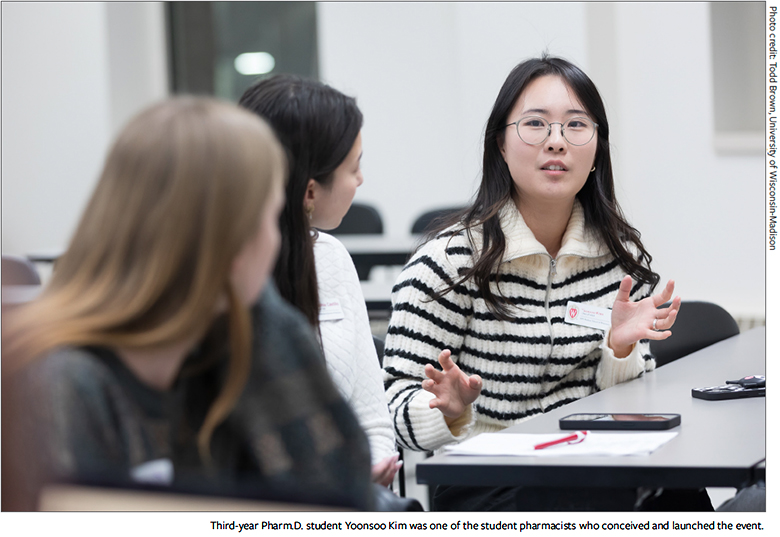A student-led diversity event at the University of Wisconsin- Madison School of Pharmacy focused on the need for compassionate, equitable patient care.
By Emily Jacobs
Many different factors can influence a person’s health outcomes. Some are obvious, such as diet and genetics, while others are less apparent, such as housing status and language barriers. Healthcare providers, including pharmacists, can help improve patient outcomes with a better understanding of those unique, underlying influences on healthcare.
This was the central idea behind the DiveRxsity Dialogues event, created and organized by students at the University of Wisconsin–Madison School of Pharmacy. With funding through a grant from Phi Lambda Sigma (PLS), this event brought together students, faculty and staff to discuss topics involving health disparities and inclusive care. Dr. Sally Arif, professor of pharmacy practice at Midwestern University, delivered the keynote address for DiveRxsity Dialogues, speaking on the value of inclusion in pharmacy and navigating concerns such as implicit bias. Other topics covered during the event included housing instability, gender-affirming care and how racism impacts healthcare.
Greater Awareness
Many student pharmacists will go on to serve diverse patient populations with needs that go far beyond receiving medication. When pharmacists understand different influences on patients’ lives and health outcomes, it can help build trust between patients and providers and lead to greater medication adherence. By bringing attention to this in pharmacy school, pharmacists will be better prepared to serve their unique patient populations in their new careers.

“Pharmacists really need to be attuned to the varied experiences of their patients’ lives, and that allows for these more equitable outcomes for our patients, those that might have different experiences that might not be so straightforward,” said Lisa Imhoff, associate dean for Diversity, Equity and Inclusion at UW-Madison’s School of Pharmacy. The School of Pharmacy’s strategic plan emphasizes preparing students to serve marginalized and vulnerable populations. This led faculty members to include more concepts and patient case scenarios focused on diversity in the curriculum. For example, a “Professional Development and Engagement” course touches on discrimination and other inclusivity issues through professional insights.
However, students wanted to take the subject of inclusion and diversity further, seeking more opportunities for small groups to discuss these issues in greater detail. Thus, DiveRxsity Dialogues was conceived and launched entirely by UW-Madison student pharmacists. PLS student leaders Mara Gosch and Amy Bowles partnered with two other student organizations: Promoting Recognition of Identity, Dignity and Equality (PRIDE) in Healthcare and the Student National Pharmaceutical Association (SNPhA). This level of collaboration and the effort to include other student organizations demonstrated that the student organizers took the issue seriously, noted Imhoff.
“As an international student, I’ve observed that discrimination still exists among students, and unfortunately, it’s a widespread issue,” said third-year Pharm.D. student Yoonsoo Kim, SNPhA co-president and one of the event organizers. “Inspired by healthcare professionals who respect and listen to all patients, we felt it was crucial to address one of our topics, ‘Structural Racism in Healthcare,’ to encourage students’ better attitudes and behaviors.”

Student organizers and faculty are working to make DiveRxsity Dialogues an annual event, allowing each student to share ideas and learn from diverse healthcare providers. “As university students pursuing pharmacy degrees, our primary focus naturally revolves around understanding various medications and their applications,” Kim said. “However, the role of pharmacists extends far beyond dispensing prescriptions, and they are integral members of healthcare teams responsible for providing patient consultation and care. Therefore, understanding diverse patient backgrounds becomes paramount for the future.”
Imhoff is working with student organizers and other faculty to consider how to sustain the DiveRxsity Dialogues event over time. Part of the plan, she noted, is for the School of Pharmacy to offer an inclusive healthcare track, in which the different student organizations that participate in DiveRxsity Dialogues will hold individual events during a semester. Students who attend these events and complete relevant assignments could get credit toward that inclusive healthcare track.
“I think our students are hungry for more because they are seeing that there’s this need,” Imhoff said. “So the fact that they stepped up to fill the need, I was very impressed and excited that we have this next generation that I think is going to make a significant impact on the field of pharmacy.”
Emily Jacobs is a freelance writer based in Toledo, Ohio.

